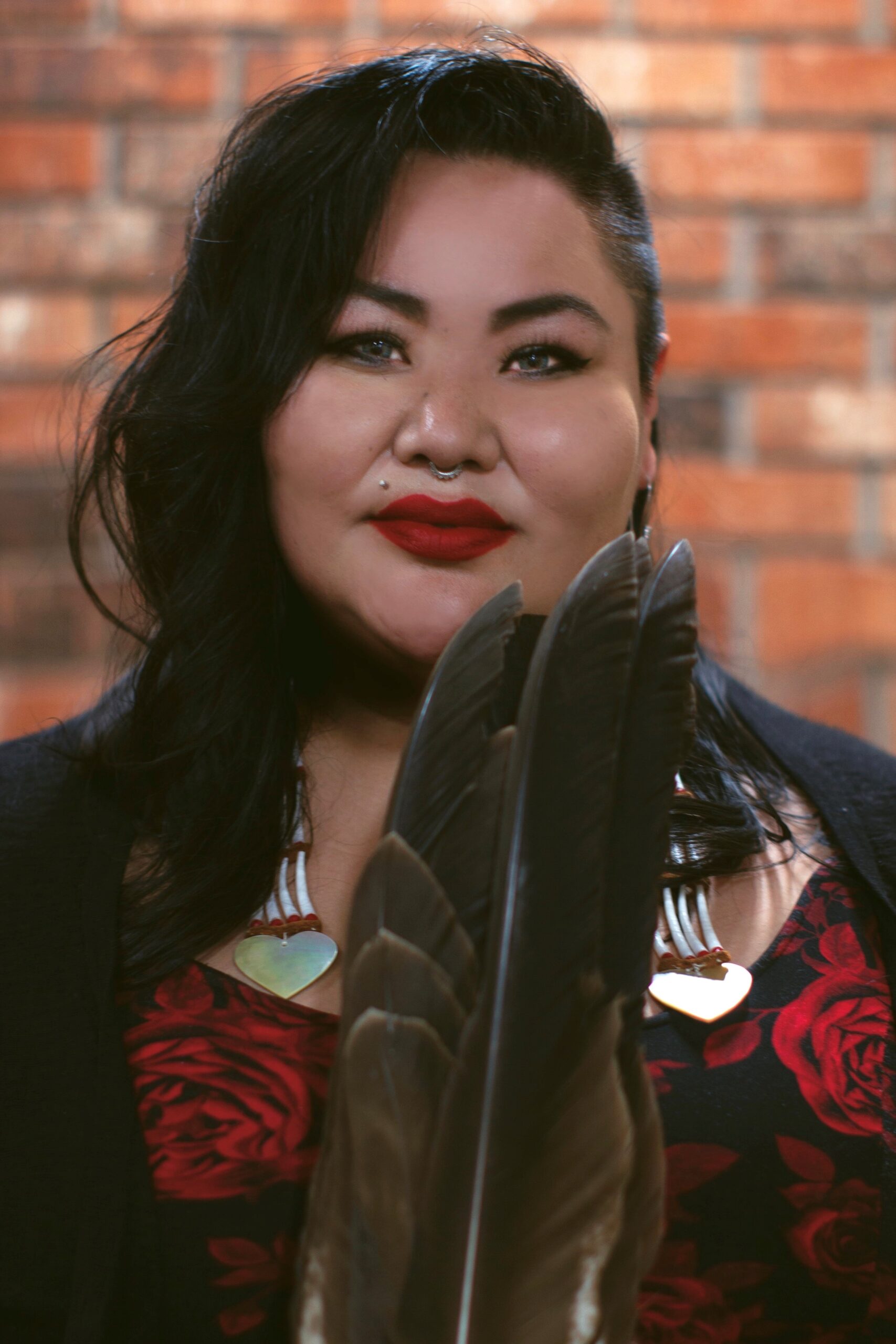Noem calls on Trump to end road blocks

Candi Brings Plenty: “Tribal sovereignty allows the tribes to operate these checkpoints within their land.” (PHOTO COURTESY / ACLU)
By Justine Anderson
Native Sun News Today Correspondent
PIERRE – At a May 21 teleconference, South Dakota Gov. Kristi Noem said she sent a letter asking U.S. President Donald Trump to help end Cheyenne River Sioux Indian Reservation coronavirus checkpoints, noting that they set “precedent.”
Her remark was in response to a journalist’s question relating her stance against checkpoint legality to her concern over use of the reservation routes to carry supplies for impending construction of the Keystone XL tar-sands crude-oil pipeline, opposed by all nine of South Dakota’s tribes.
“For every action that we take, and the tribes take, they’re setting precedent,” said Noem. “If we allow checkpoints to shut down traffic in this situation, then we are setting precedent for that to happen far into the future in many other situations as well.” She is a staunch supporter of the Canadian pipeline.
The Cheyenne River, Oglala and Rosebud Sioux tribal governments, which have set up highway health inspection booths inside boundaries of their jurisdiction during the pandemic of the last couple months, insist they do not shut down traffic.
Noem’s letter to Trump went out May 20, two days after the American Civil Liberties Union of South Dakota criticized her for “undermining” tribal sovereignty by demanding removal of the checkpoints.
Her demands and associated threats of legal action constitute “unnecessary escalation of the already strained relationship” between the state and tribes,” it said.
Noem told Trump that the federal assistance she asks is “to bring a prompt end to these unlawful tribal checkpoints/blockades on U.S./State highways” as “a final alternative to formal litigation.”
Oglala Sioux tribal member Candi Brings Plenty, the ACLU of South Dakota’s indigenous justice organizer, echoed Lakota elected leaders’ arguments, saying, “Tribal sovereignty allows the tribes to operate these checkpoints within their land.”
Brings Plenty noted, “Undermining that tribal sovereignty, that authority for the tribes to govern themselves, goes against the treaties the tribes have with the United States government.” She highlighted, not just that right but also the need for tribal nations to protect themselves in a time of pandemic.
“Per the U.S. Constitution, these treaties are the law of the land. But even with an obligation to uphold all treaties, the government’s track record is dismal,” she said. “So, for the tribes, these checkpoints are essential to protecting the health of the people on the reservations.”
Noem said she is “asking for immediate federal assistance” to require the Cheyenne River Sioux Tribe to comply with “procedures” set forth in an April memo from Bureau of Indian Affairs Director Darryl LaCounte to the Cheyenne River Sioux and Oglala Sioux tribes saying they needed permission from the state before establishing checkpoints on state and U.S. highways.
Along with the letter to Trump, Noem sent affidavits and offered to send video recordings from an investigation she ordered into the checkpoints by the South Dakota Attorney General Jason Ravnsborg.
Noem said she would release neither the affidavits nor the video recordings to the public while the investigation is ongoing.
“I think there’s more at play here than just the right of way,” conjectured Kimberly Craven, legal director of the ACLU of South Dakota. “I’ve been looking at Highway 212 — the one running east and west — and that’s the one I think TransCanada will want to use to haul all their pipes over,” she told the Native Sun News Today.”
TransCanada Corp. is the original name of TC Energy Corp., which is seeking permits to build the mega project across tribally unceded 1868 Ft. Laramie Treaty territory in Montana, South Dakota, and Nebraska.
The Cheyenne River Sioux Tribe is the one with checkpoints on Highway 212. Noem did not ask Trump for help with the other tribes.
Disputes over Keystone XL Pipeline construction traffic on Cheyenne River Sioux Reservation land is not unprecedented. In July of 2019, tribal police officers escorted several of the project’s construction-related vehicles off the reservation via U.S. Highway 212.
The vehicles were in violation of Cheyenne River Sioux Tribe Resolution No. 304-2012-CR. The resolution requires that “…any and all Keystone XL trucks and escort vehicles that drive onto our reservation be turned around immediately and go back the way they entered the reservation…”
After the incident, Cheyenne River Sioux Chair Harold Frazier said in a news release, “Any vehicles or personnel working on the Keystone XL Pipeline are not welcome on the reservation.”
Craven lamented, “When it comes down to it, it’ll probably go to court, which is really unfortunate and costly.”
She noted, “It’s the moral and ethical thing to do, to support the tribes during a pandemic. Why would you pick a fight with these people when there’s a pandemic going on? The reason is the pipeline…. She wants to make it about rights-of-way and tribes want to make it about protecting their people.”
(Contact Justine Anderson at justinekanderson@gmail.com)
